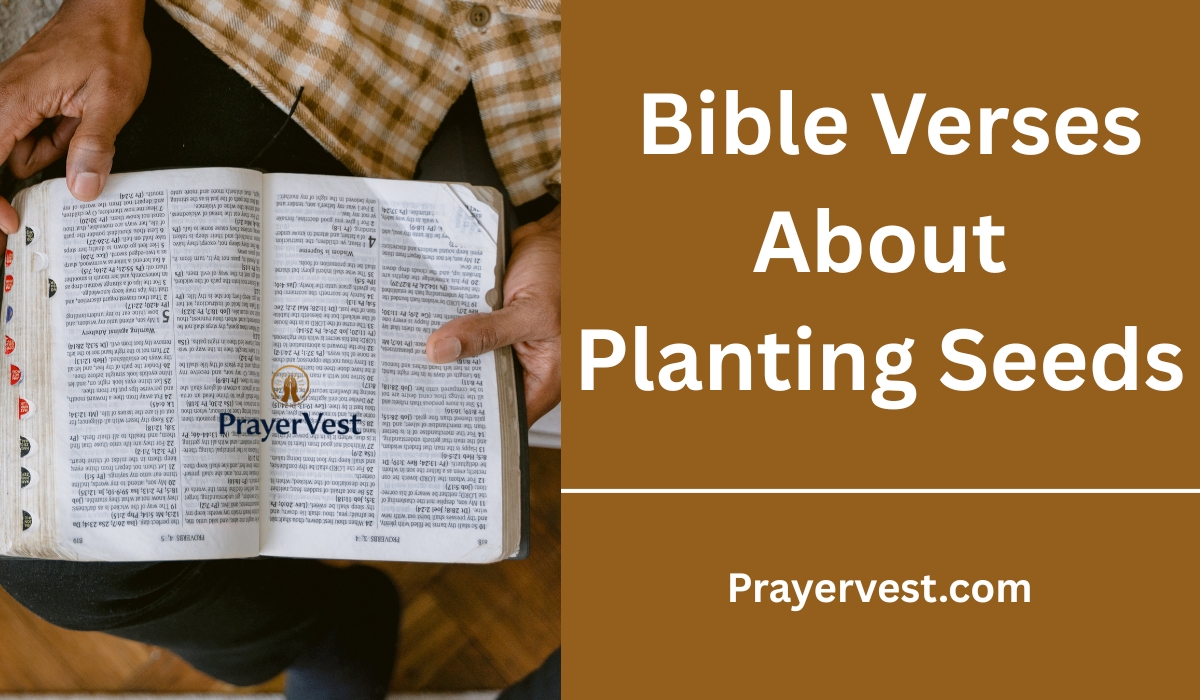One of the Bible’s most potent and recurrent themes is planting seeds, which has both literal and spiritual meaning. The concept of sowing and reaping is used to explain how God operates in our lives in both the creation myth and Jesus’ parables.
In the same way that a small seed sown in the earth might eventually grow into a bountiful tree, our words, deeds, faith, and obedience, when cultivated over time, yield a harvest. Scripture teaches us about patience, tenacity, and the power of faith that starts tiny but blossoms into something transformative through the imagery of seeds.
The concepts of faith, righteousness, and charity are frequently linked to the act of sowing seeds in both the Old and New Testaments. The Bible serves as a reminder that whatever we plant, whether it be good or terrible, will eventually bear fruit. In Galatians, Paul explains that although sowing to the flesh results in destruction, sowing freely yields many harvests.
Jesus frequently emphasizes in his parables how crucial the state of the soil—our hearts—is to the growth and success of God’s Word. These verses push us to think about where and how we are planting in addition to what we are planting.


Knowing that every decision has long-term effects inspires believers to act intentionally by studying Bible scriptures on sowing seeds. They serve as a reminder that God asks us to sow the seeds of righteousness, love, and faith and then wait for the increase to come in His perfect time. We must wait patiently for God to produce fruit from the seeds we plant in His name, just as a farmer must wait patiently for the harvest. These verses encourage us to plant prudently, give liberally, and tend to the seeds of faith that will eventually bear a bountiful and everlasting crop.
40 Inspiring Bible Verses About Planting Seeds (2026)
1. Genesis 8:22
“As long as the earth endures, seedtime and harvest, cold and heat, summer and winter, day and night will never cease.”
This verse reminds us of God’s promise after the flood, establishing the rhythm of life through the cycles of sowing and reaping. Planting seeds is more than just agriculture; it symbolizes the principles of diligence, patience, and faith. Just as a farmer trusts the soil and the seasons, believers are called to trust God’s faithfulness in the spiritual harvest of their labor, prayers, and good works.
2. Psalm 126:5
“Those who sow with tears will reap with songs of joy.”
This powerful verse reflects the connection between hardship and hope. Sowing seeds often requires sacrifice, whether in time, energy, or emotion. Yet, God assures that the tears we shed in faith and perseverance will eventually produce a joyful harvest. It is a promise that even our struggles, when entrusted to Him, will yield blessings and joy beyond what we can imagine.
3. Ecclesiastes 11:6
“Sow your seed in the morning, and at evening let your hands not be idle, for you do not know which will succeed, whether this or that, or whether both will do equally well.”
This verse encourages consistency and diligence in sowing. Just as a farmer cannot predict which seeds will flourish, we too must commit our efforts to God without discouragement. The message here is to keep working faithfully in every season, knowing that God determines the growth and fruitfulness of our labor. Our role is to sow generously and trust Him with the results.
4. 2 Corinthians 9:6
“Remember this: Whoever sows sparingly will also reap sparingly, and whoever sows generously will also reap generously.”
The apostle Paul uses the imagery of sowing to emphasize generosity in giving. Just as the quantity of seeds planted determines the abundance of the harvest, so does the measure of our generosity affect the blessings we receive. This verse teaches us the principle of abundant sowing—not only with material possessions but also with love, kindness, and service to others—trusting God to multiply it back.
5. Galatians 6:7
“Do not be deceived: God cannot be mocked. A man reaps what he sows.”
This verse lays down one of the clearest principles of sowing and reaping. Whatever we plant—whether good or evil—will eventually bear fruit. Paul reminds believers that choices have consequences, and God’s justice ensures that the harvest will match the seed. It is both a warning against sinful living and an encouragement toward righteousness and generosity.
6. Hosea 10:12
“Sow righteousness for yourselves, reap the fruit of unfailing love, and break up your unplowed ground; for it is time to seek the Lord, until he comes and showers his righteousness on you.”
Here, sowing is directly tied to spiritual renewal. God calls His people to plant seeds of righteousness by seeking Him and living uprightly. Breaking up unplowed ground symbolizes repentance—preparing our hearts to receive His blessings. The result of such sowing is not only love but also an outpouring of divine favor and righteousness.
7. Matthew 13:3
“Then he told them many things in parables, saying: ‘A farmer went out to sow his seed.’”
This verse introduces the parable of the sower, one of Jesus’ most well-known teachings. The act of sowing represents the spreading of God’s Word, and the soil represents the condition of human hearts. Some seeds grow, some wither, and some are choked, but the faithful sower keeps planting. This passage challenges us to be both sowers of the Word and fertile ground for God’s truth.
8. James 3:18
“Peacemakers who sow in peace reap a harvest of righteousness.”
James connects sowing with the pursuit of peace. Just as seeds grow in fertile soil, peace fosters an environment where righteousness can flourish. Those who plant peace—through reconciliation, kindness, and humility—will enjoy a harvest filled with godly fruit. This verse shows that what we sow in relationships directly impacts the spiritual harvest we receive.
9. Luke 8:11
“This is the meaning of the parable: The seed is the word of God.”
Jesus makes it clear: the seed in His parables represents God’s Word. Just as seeds contain the potential for growth and life, so does Scripture contain the power to transform lives. Planting this seed requires faithfulness in sharing the gospel, trusting that God will cause it to grow in hearts that are ready to receive it.
10. 1 Corinthians 3:6
“I planted the seed, Apollos watered it, but God has been making it grow.”
Paul uses farming imagery to illustrate ministry. While human effort plays a role—planting and watering—growth ultimately comes from God alone. This truth encourages believers to do their part faithfully without pride or discouragement. Whether we are planting seeds of faith, hope, or kindness, it is God’s divine power that brings the harvest.
11. Mark 4:26-27
“He also said, ‘This is what the kingdom of God is like. A man scatters seed on the ground. Night and day, whether he sleeps or gets up, the seed sprouts and grows, though he does not know how.’”
This parable reminds us that growth in the Kingdom of God is often unseen and mysterious. Just as a farmer cannot fully explain how a seed grows beneath the soil, so God works in ways beyond our understanding. Our responsibility is to sow faithfully; the miracle of transformation belongs to Him.
12. Proverbs 11:18
“A wicked person earns deceptive wages, but the one who sows righteousness reaps a sure reward.”
This proverb contrasts the temporary gains of wickedness with the eternal rewards of righteousness. Planting seeds of truth, honesty, and justice may not always yield instant results, but God promises a certain and lasting harvest for those who live uprightly. It’s a call to sow with eternity in mind.
13. Isaiah 55:10-11
“As the rain and the snow come down from heaven, and do not return to it without watering the earth and making it bud and flourish… so is my word that goes out from my mouth: It will not return to me empty.”
God compares His Word to life-giving rain that causes seeds to grow. Just as nature ensures that seeds sprout in their season, God’s Word always accomplishes its purpose. This passage reassures believers that when we plant Scripture into lives, its power will bear fruit according to His will.
14. Proverbs 22:8
“Whoever sows injustice reaps calamity, and the rod they wield in fury will be broken.”
The principle of sowing and reaping applies to evil as well. Those who plant seeds of injustice, cruelty, or oppression will ultimately face ruin. This warning serves as a reminder that the harvest always reflects the seed, urging us to sow with wisdom, mercy, and fairness.
15. Matthew 13:23
“But the seed falling on good soil refers to someone who hears the word and understands it. This is the one who produces a crop, yielding a hundred, sixty, or thirty times what was sown.”
Jesus explains that the fruitful harvest comes from receptive hearts. The good soil symbolizes believers who not only hear God’s Word but also live by it. Their lives bear abundant fruit, multiplying the impact of the gospel far beyond the initial seed planted.
16. Jeremiah 4:3
“This is what the Lord says to the people of Judah and to Jerusalem: ‘Break up your unplowed ground and do not sow among thorns.’”
God urges His people to prepare their hearts before planting seeds of righteousness. Just as a farmer must clear weeds and till the soil, we must remove sin and distractions from our lives to make room for spiritual growth. True fruitfulness begins with repentance and readiness to receive God’s Word.
17. Job 4:8
“As I have observed, those who plow evil and those who sow trouble reap it.”
Job’s friend Eliphaz reflects on the principle of sowing, pointing out that evil deeds inevitably bring destructive results. While his application to Job’s suffering was misguided, the underlying truth stands: the seeds we plant in life—whether good or bad—determine the nature of our harvest.
18. Matthew 17:20
“Truly I tell you, if you have faith as small as a mustard seed, you can say to this mountain, ‘Move from here to there,’ and it will move. Nothing will be impossible for you.”
Here, Jesus teaches that even the smallest seed of faith can produce extraordinary results. The mustard seed, though tiny, grows into a large tree. Likewise, faith, when planted and nurtured, can accomplish what seems impossible, proving the limitless power of God at work in believers.
19. Leviticus 26:5
“Your threshing will continue until grape harvest and the grape harvest will continue until planting, and you will eat all the food you want and live in safety in your land.”
God’s covenant blessing to Israel included abundant harvests as a sign of His favor. This verse illustrates how obedience leads to provision and plenty. For believers today, it symbolizes God’s faithfulness to meet our needs when we walk in alignment with Him.
20. John 12:24
“Very truly I tell you, unless a kernel of wheat falls to the ground and dies, it remains only a single seed. But if it dies, it produces many seeds.”
Jesus uses the imagery of a seed dying to teach about His own sacrifice. Just as a seed must be buried to bring forth life, His death on the cross brought forth eternal life for many. This verse also calls believers to die to self in order to bear fruit for God’s kingdom.
21. 2 Corinthians 9:10
“Now he who supplies seed to the sower and bread for food will also supply and increase your store of seed and will enlarge the harvest of your righteousness.”
Paul reminds believers that God Himself is the source of both the seed and the harvest. He not only provides what we need to sow but also multiplies our efforts when done in faith. This verse encourages generosity, knowing that God abundantly blesses those who plant seeds for His kingdom.
22. Matthew 6:26
“Look at the birds of the air; they do not sow or reap or store away in barns, and yet your heavenly Father feeds them. Are you not much more valuable than they?”
Jesus uses creation to reassure believers of God’s care. Unlike farmers who sow and reap, birds rely solely on God’s provision—yet they are sustained. If God provides for them, how much more will He meet the needs of His children? This verse encourages trust in His faithfulness.
23. Proverbs 20:4
“Sluggards do not plow in season; so at harvest time they look but find nothing.”
This proverb warns against laziness in sowing. Just as farmers must work diligently in the proper season, we too must be faithful in planting seeds of effort, prayer, and obedience. Failing to act at the right time leads to missed opportunities and empty harvests.
24. Mark 4:8
“Still other seed fell on good soil. It came up, grew and produced a crop, some multiplying thirty, some sixty, some a hundred times.”
This verse highlights the fruitfulness of receptive hearts. The good soil represents those who fully embrace God’s Word, leading to exponential growth. It demonstrates that one seed, when nurtured properly, has the power to multiply and impact countless lives.
25. Galatians 6:9
“Let us not become weary in doing good, for at the proper time we will reap a harvest if we do not give up.”
Paul encourages perseverance in sowing seeds of goodness. The process of planting and waiting can be tiring, but God promises a harvest in due season. This verse reassures believers that faithfulness and persistence will yield blessings, as long as we remain steadfast.
26. Matthew 13:31-32
“The kingdom of heaven is like a mustard seed, which a man took and planted in his field. Though it is the smallest of all seeds, yet when it grows, it is the largest of garden plants and becomes a tree.”
Jesus uses the mustard seed to illustrate the growth of God’s Kingdom. Though small in beginning, it expands into something great and influential. This verse shows how even the smallest act of faith can lead to tremendous impact when entrusted to God.
27. Hosea 8:7
“They sow the wind and reap the whirlwind. The stalk has no head; it will produce no flour. Were it to yield grain, foreigners would swallow it up.”
This verse warns of the consequences of sowing sin and rebellion. Planting emptiness leads to destruction, just as sowing wind results in a whirlwind. It is a sobering reminder that choices against God’s will bear destructive fruit, not blessing.
28. Luke 6:38
“Give, and it will be given to you. A good measure, pressed down, shaken together and running over, will be poured into your lap. For with the measure you use, it will be measured to you.”
Jesus teaches that generosity produces abundance. The act of sowing kindness, love, and resources leads to a harvest greater than what was given. This verse affirms the principle of reciprocal blessing and God’s overflowing provision.
29. Psalm 107:37
“They sowed fields and planted vineyards that yielded a fruitful harvest.”
This verse celebrates God’s blessing over His people as they planted and reaped abundantly. It is both a literal picture of agricultural prosperity and a spiritual truth—that God rewards diligence and faithfulness with fruitful results.
30. Deuteronomy 28:12
“The Lord will open the heavens, the storehouse of his bounty, to send rain on your land in season and to bless all the work of your hands. You will lend to many nations but will borrow from none.”
As part of His covenant promises, God assures Israel of abundant provision when they obey Him. The imagery of rain and fruitful harvest symbolizes divine favor and prosperity. For believers, it represents God’s blessing over the seeds we plant in obedience to His Word.
31. Isaiah 30:23
“He will also send you rain for the seed you sow in the ground, and the food that comes from the land will be rich and plentiful. In that day your cattle will graze in broad meadows.”
This verse paints a picture of God’s abundant blessing on the work of His people. The seed planted in faith prospers under His provision. It serves as a reminder that every fruitful harvest is the result of God’s favor and timely rain from heaven.
32. Matthew 13:37
“The one who sowed the good seed is the Son of Man.”
Here Jesus identifies Himself as the sower of good seed in the parable of the weeds. The seed represents the children of the kingdom, planted by Christ Himself. This verse shows that our very lives are seeds sown by God to bring forth His kingdom on earth.
33. Zechariah 8:12
“The seed will grow well, the vine will yield its fruit, the ground will produce its crops, and the heavens will drop their dew. I will give all these things as an inheritance to the remnant of this people.”
This prophetic promise points to restoration and blessing. God assures His people of abundant harvest as a sign of His covenant love. It reminds us that even after seasons of difficulty, God can restore and prosper the seeds planted in faith.
34. James 5:7
“Be patient, then, brothers and sisters, until the Lord’s coming. See how the farmer waits for the land to yield its valuable crop, patiently waiting for the autumn and spring rains.”
James uses the farmer’s patience as an example for believers awaiting Christ’s return. Just as a farmer cannot rush the harvest, we too must wait on God’s timing. Planting seeds of faith requires endurance, trust, and hope in His promises.
35. Mark 4:14
“The farmer sows the word.”
This simple but powerful verse identifies the seed as God’s Word. Just like a farmer scattering seed, every believer is called to spread Scripture. The responsibility lies in sowing faithfully, leaving the growth and harvest to God.
36. Amos 9:13
“The days are coming, declares the Lord, when the reaper will be overtaken by the plowman and the planter by the one treading grapes. New wine will drip from the mountains and flow from all the hills.”
This prophecy describes an overflowing harvest so abundant that sowing and reaping happen simultaneously. It points to God’s supernatural blessing and abundance, reminding us that when He restores, His provision exceeds human expectation.
37. Matthew 25:26-27
“You wicked, lazy servant! So you knew that I harvest where I have not sown and gather where I have not scattered seed? Well then, you should have put my money on deposit with the bankers, so that when I returned I would have received it back with interest.”
In the parable of the talents, Jesus rebukes the servant who failed to sow what was entrusted to him. This passage teaches accountability for the resources, opportunities, and gifts God gives us. Planting seeds of diligence and stewardship brings multiplication, while laziness results in loss.
38. Isaiah 61:11
“For as the soil makes the sprout come up and a garden causes seeds to grow, so the Sovereign Lord will make righteousness and praise spring up before all nations.”
Isaiah compares spiritual renewal to seeds sprouting from the soil. God Himself ensures that righteousness and worship flourish in the world. Just as seeds grow naturally in fertile ground, God brings forth His purposes in His timing and power.
39. 1 Peter 1:23
“For you have been born again, not of perishable seed, but of imperishable, through the living and enduring word of God.”
Peter describes the new birth as a result of God’s imperishable seed—His eternal Word. Unlike natural seeds that perish, the gospel produces everlasting life. This verse highlights the transformative power of Scripture in bringing spiritual rebirth and growth.
40. Revelation 22:2
“Down the middle of the great street of the city, on each side of the river, stood the tree of life, bearing twelve crops of fruit, yielding its fruit every month. And the leaves of the tree are for the healing of the nations.”
In the vision of the New Jerusalem, the imagery of fruit-bearing trees reflects the ultimate harvest of God’s kingdom. The seeds planted throughout Scripture culminate in eternal abundance and healing. It is the final fulfillment of every promise, where God’s people reap the eternal harvest of life.
Conclusion
Finally, the fundamental fact that what we sow in life influences the harvest we reap is brought home to us by Bible scriptures about planting seeds. The act of planting demonstrates trust in God’s timing and process, whether it is via love, obedience, faith, or giving. Because God values every seed sown in righteousness, believers are urged to live truthfully, much like a farmer who waits patiently for development rather than seeing fruit immediately. These verses exhort us to make deliberate decisions and sow seeds that will bear fruit for God’s glory as well as for others and ourselves.
In the end, the Bible’s theme of sowing seeds suggests optimism, tenacity, and divine cooperation. God ensures that every effort done in faith is not in vain by providing the increase while we plant and water. Every tiny deed of obedience, prayer, or kindness has the capacity to blossom into something much bigger than we could ever have imagined. We can align ourselves with God’s kingdom principles and get ready for a harvest that will benefit our lives and last forever by sowing with patience and confidence.






